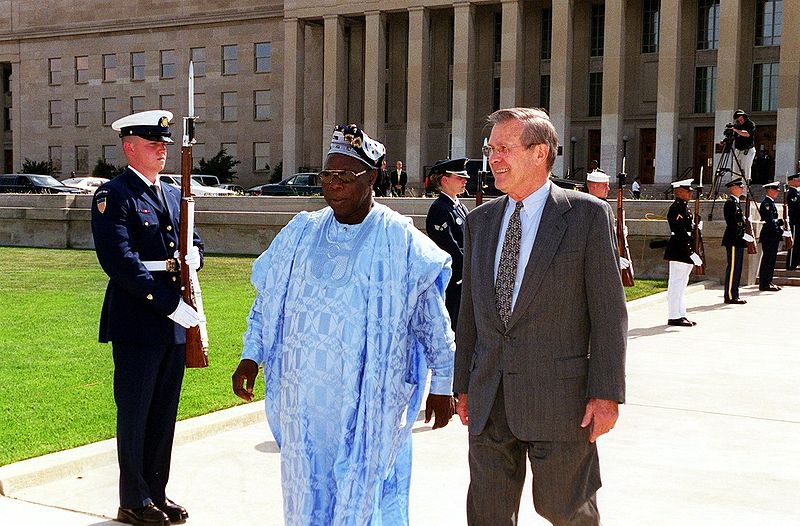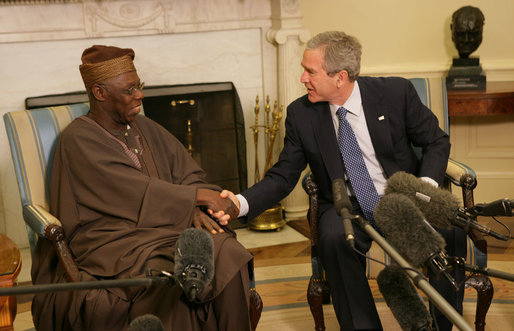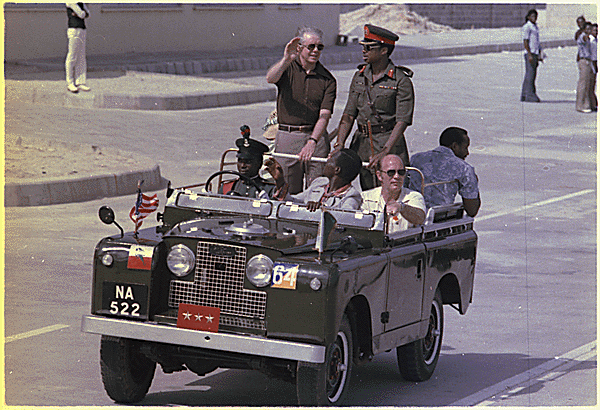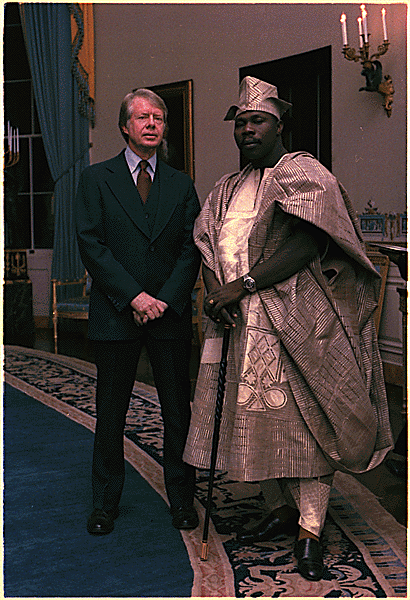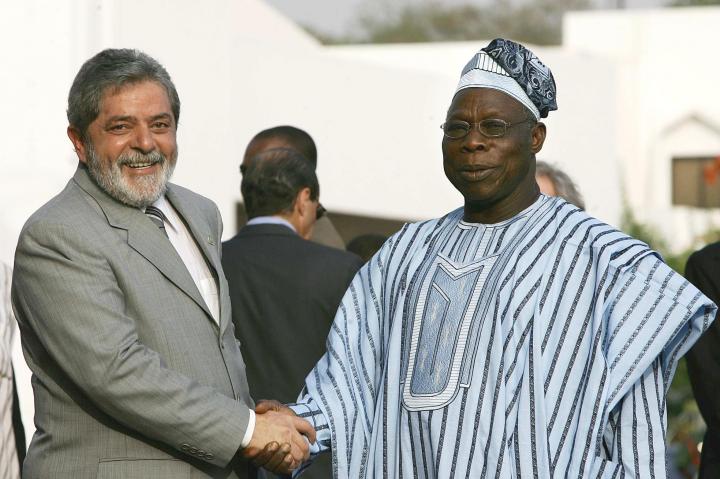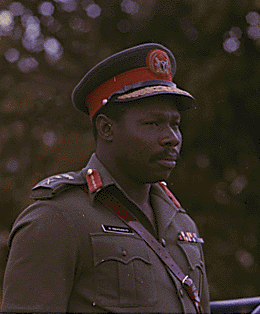<Back to Index>
- 12th President of Nigeria Oluṣẹgun Mathew Okikiọla Arẹmu Ọbasanjọ, 1937
PAGE SPONSOR
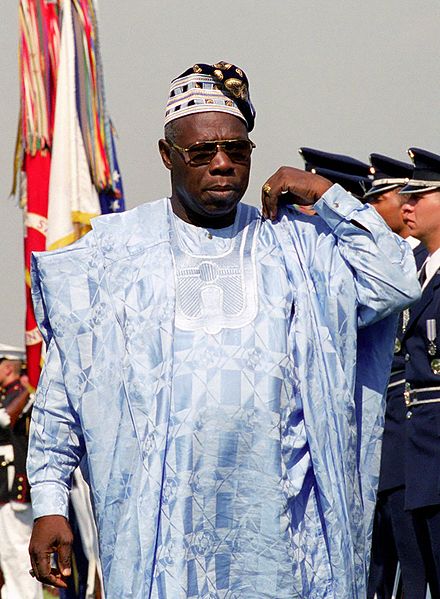
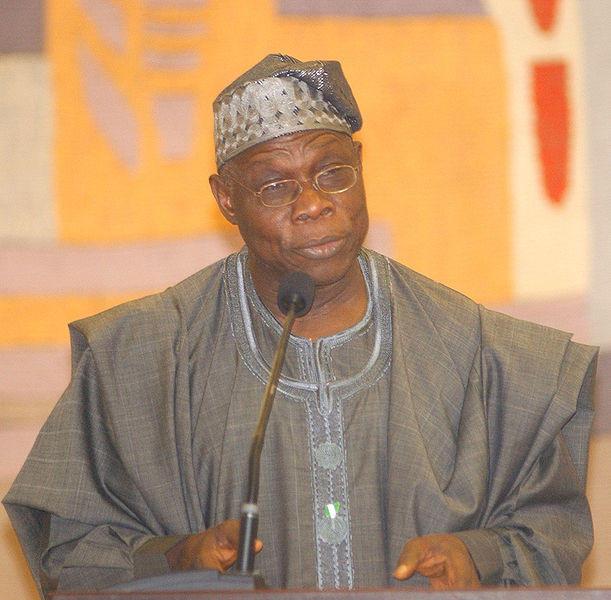
Oluṣẹgun Mathew Okikiọla Arẹmu Ọbasanjọ, (born circa 5 March 1937) is a former Nigerian Army general and former President of Nigeria. A Nigerian of Yoruba descent, Obasanjo was a career soldier before serving twice as his nation's head of state, once as a military ruler, between 13 February 1976 to 1 October 1979 and again from 29 May 1999 to 29 May 2007, as elected President. His current home is Abeokuta, the Capital City of Ogun State, where he is a nobleman and holder of the titles of the Balogun of the Owu Lineage and the Ekerin Balogun of the Egba clan of Yorubaland.
Ọbasanjọ was born in Ogun State; and grew up in Owu (Abeokuta). He enlisted in the Nigerian Army in 1958. His first name, Olusegun, means "The Lord is victorious". He trained at Aldershot, and was then commissioned as an officer in the Nigerian Army. He served at 1 Area Command in Kaduna and then became Chief Army Engineer, then commander of 2 Area Command from July 1967, which was redesignated 2 Division Rear, and then the Ibadan Garrison Organisation. He was also trained in DSSC, Wellington. During the Nigerian Civil War, he commanded the Army's 3 Marine Commando Division that took Owerri, effectively bringing an end to the civil war.
Although Brig. Ọbasanjọ did not directly participate in the military coup of 29 July 1975, led by Murtala Mohammed, he supported it and was named Murtala's deputy in the new government. As chief of staff of Supreme Headquarters, Obasanjo sought advice from Rogerlay of Akobi and thus had the support of the military. On 13 February 1976, he was marked for assassination along with Murtala and other senior military personnel by coup plotters, led by Army Col. Dimka. Although Murtala was killed during the attempted coup, Obasanjo escaped death as another officer's vehicle was mistaken for his. The low profile security policy adopted by Murtala in guarding very important persons allowed the plotters easy access to their targets. The coup was foiled because the plotters missed Obasanjo and General Theophilus Danjuma, chief of army staff and de facto number three man in the country. The plotters also failed to monopolize communications, although they were able to take over the radio station to announce the coup attempt. Obasanjo and Danjuma were able to establish a chain of command and re - established security in Lagos, thereby regaining control. Obasanjo was made head of state in a meeting of the Supreme Military Council. Keeping the chain of command established by Murtala Muhammad in place, Obasanjo pledged to continue the programme for the restoration of civilian government in 1979 and to carry forward the reform programme to improve the quality of public service.
The second republican constitution, which was adopted in 1979, was modelled on the Constitution of the United States, with provision for a President, Senate, and House of Representatives. The country was now ready for local elections, to be followed by national elections, that would return Nigeria to civilian rule.
The military regimes of Murtala Muhammad and Obasanjo benefited from a tremendous influx of oil revenue that increased 350 percent between 1973 and 1974, when oil prices skyrocketed, to 1979, when the military stepped down. Increased revenues permitted massive spending; this spending, however, was poorly planned and concentrated in urban areas. The oil boom was marred by a minor recession in 1978 - 79, but revenues rebounded until mid 1981.
Plans were undertaken for the movement of the federal capital from Lagos to Abuja,
a more central location in the interior of the country. Such a step was
seen as a means of encouraging the spread of industrial development
inland and of relieving the congestion that threatened to choke Lagos.
Abuja also was chosen because it was not identified with any particular
ethnic group.
Industrialisation, which had grown slowly after World War II through the civil war, boomed in the 1970s, despite many infrastructure constraints. Growth was particularly pronounced in the production and assembly of consumer goods, including vehicle assembly and the manufacture of soap and detergents, soft drinks, pharmaceuticals, beer, paint, and building materials. Furthermore, there was extensive investment in infrastructure from 1975 to 1980, and the number of parastatals — jointly government and privately owned companies — proliferated. The Nigerian Enterprises Promotion decrees of 1972 and 1977 further encouraged the growth of an indigenous middle class.
Heavy investment was planned in steel production. With Soviet assistance, a steel mill was developed at Ajaokuta in Kogi State, not far from Abuja. However there was a significant decline in agriculture and industries associated with agriculture.
The
increase in revenues due to the oil boom resulted in a rise in
income, especially for the urban middle class. There was a corresponding
inflation, particularly in the price of food, that promoted both
industrialisation and the expansion of agricultural production. As a
result of the shift to food crops, the traditional export earners —
peanuts, cotton, cocoa, and palm products — declined in significance and
then ceased to be important at all. Nigeria's exports became dominated
by oil. In
response to this the government embarked on a "Green Revolution", seed
and fertilliser were given to farmers to increase nation wide
productivity in farming.
Education
also expanded rapidly. At the start of the civil war, there were only
five universities, but by 1975 the number had increased to thirteen,
with seven more established over the next several years. In 1975 there
were 53,000 university students. There were similar advances in primary
and secondary school education, particularly in those northern states
that had lagged behind. During Obasanjo's regime, universal Primary
education was introduced nationwide.
Obasanjo
was also accused of being responsible for political repression. In one
particular instance, the compound of Nigerian musician and political activist Fela Kuti was
raided and burned to the ground after a member of his commune was
involved in an altercation with military personnel. Fela and his family
were beaten and raped and his mother, political activist Funmilayo Ransome Kuti,
was killed by being thrown from a window. Her coffin was carried to
Obasanjo's barracks as a protest against political repression.
Obasanjo served until 1 October 1979, when he handed power to Shehu Shagari,
a democratically elected civilian president - hence becoming the first
Military Head of state to transfer power peacefully to a civilian regime
in Nigeria . In late 1983, however, the military seized power again.
Obasanjo, being in retirement, did not participate in that coup.
During the dictatorship of Sani Abacha (1993 – 1998), Obasanjo spoke out against the human rights abuses
of the regime, and was imprisoned for his participation in an aborted
coup. He was released only after Abacha's sudden death on 8 June 1998.
While in prison, Obasanjo became a born again Christian. He became a follower of the Preacher Dr. Danny McCain.
In the 1999 elections, the first in sixteen years, he decided to run for the presidency as the candidate of the People's Democratic Party. Obasanjo won with 62.6% of the vote, sweeping the strongly Christian Southeast and the predominantly Muslim north, but decisively lost his home region, the Southwest, to his fellow Yoruba and Christian, Olu Falae, the only other candidate. His loss in the South West has been attributed to his being very unpopular amongst his kinsmen in the South - West. This was because he had come to represent policies and actions that tend to burden the majority of the people. The Yorubas, his kinsmen are known to deride oppressors. Apart from this, he was also against the Yorubas' rigorous quest to revalidate the election won by Chief MKO Abiola in 1993. These aggregates of issues made the Yorubas suspicious of him and they expressed this by massively voting against him in 1999. 29 May 1999, the day Obasanjo took office as the first elected and civilian head of state in Nigeria after 16 years of military rule, is now commemorated as Democracy Day, a public holiday in Nigeria.
Obasanjo spent most of his first term travelling abroad visiting mostly western countries. He claimed this was to polish the country image and re-establish the country in the international scene after being battered and stained by the regime of Gen. Abacha. He succeeded in winning at least some Western support for strengthening Nigeria's nascent democracy. Britain and the United States, in particular, were glad to have an African ally who was openly critical of abuses committed in Robert Mugabe's Zimbabwe at a time when many other African nations (including South Africa) were taking a softer stance. Obasanjo also won international praise for Nigeria's role in crucial regional peacekeeping missions in Sierra Leone and Liberia. The international community was guided in its approach to Obasanjo in part by Nigeria's status as one of the world's 10 biggest oil exporters as well as by fears that, as the continent's most populous nation, Nigerian internal divisions risked negatively affecting the entire continent.
At home, Obasanjo's first term was marked by widespread criticism over the Nigerian government's response to violent crises in the North — Kaduna and Kano chief among them — as well as in the central - eastern state of Benue and the southern oil rich Niger Delta. International media reports cited figures of more than 10,000 people killed in violent outbursts during Obasanjo's first term. Nigeria's military was criticized for using tactics of mass suppression — notably burning down towns such as Zaki - Biam in Benue and Odi in the Niger Delta state of Bayelsa — which Obasanjo initially defended, before later expressing regret for the lives lost.
His party, PDP, was established without him, as when he was called to contest the presidency he was languishing in prison. Thus he was not able to control the party in the direction he wanted. The party became its own opposition due to infighting.
Although Obasanjo made fighting corruption the stated aim of his first term and managed to pass some anti - corruption laws, critics both at home and abroad accused him of doing too little to reign in the excesses, particularly among federal government ministers and state governors, many of which were widely publicized in the domestic and international press.
Some
of the public officials like the National Assembly speaker and Senate
president were involved in conflicts with the president, who had to
battle many impeachment moves from both houses. Obasanjo managed to
survive impeachment and got renomination.
Obasanjo was re-elected in 2003 in a tumultuous election that had violent ethnic and religious overtones, his main opponent (fellow former military ruler General Muhammadu Buhari) being a Muslim who drew his support mainly from the north. Capturing 61.8% of the vote, Obasanjo defeated Buhari by more than 11 million votes. Buhari and other defeated candidates (including Chukwuemeka Odumegwu Ojukwu, the former Biafran leader of the 1960s who was the presidential candidate for APGA), claimed that the election was fraudulent. International observers from the European Union, and the U.S. National Democratic Institute and International Republican Institute also reported widespread voting irregularities, including in the restive oil producing Niger delta where Obasanjo's party had without explanation won close to 100% of the votes.
However, a delegation from the Commonwealth of Nations — led by representatives of former colonial power and trading partner Great Britain and African nations that had undergone troubled elections of their own — were less critical in their assessment. Much more worrying was the increasing polarisation of Nigeria along geographic and religious lines. Obasanjo swept the South, including the south - west where he had lost four years earlier, but lost considerable ground in the North. For a nation in which ethnicity and religion tie in strongly to geography, such a trend was seen by many as particularly disturbing. Other commentators might simply note that in 2003, unlike 1999, Obasanjo was running against a Northerner and could therefore expect his support to erode in the North. Obasanjo won more Northern states than Buhari, but the latter did well in his region of NW, winning Kano and retaining other ANPP states.
Since leading a public campaign against corruption and implementing economic reforms in his country, he has been widely seen abroad as an African statesman championing debt relief and democratic institutions (three times rejecting government change by coups d'état in Africa as the chairperson of the African Union). Critics of his politics say that he has used the campaign to fight his enemies and not to transform Nigeria.
Obasanjo's second term was more effective than the first. He had been able to control the party and got effective support from the National Assembly. Many governors, mostly from his party, were either exposed or prosecuted for corruption. Some ministers and state officials were also dismissed or prosecuted for corruption. Also, the Senate President was removed at Obasanjo's insistence, after he had been exposed for receiving cash for budget approval from a minister. The country witnessed the trial and dismissal of senior Naval officers for corruption and a similar fate for the chief of police. Some governors too were removed for corruption, though, some judges reversed some decisions. Obasanjo himself is seen as a corrupt leader with oil revenues going missing from the federation account and paying out over $ 50 bn on power sector to non - existent companies.
He was able to attract technocrats and Nigerian expatriates to his administration. They were able to plan various reforms in the country administration. They made effective contributions to the country's economic planning and development. His administration had now established a future planning and development for the country for the next five years.
He was well known for supporting and facilitating many illegal executive actions and ignoring judgements against himself and his government including judgements delivered by the Supreme Court. Examples included the illegal withholding of funds due to Lagos State Local Governments for more than 2 years after the Supreme Court ordered its immediate release. He also supported the illegal impeachment of several corrupt state governors which the Supreme Court also reversed. The National Judicial Council demonstrated its independence by dismissing several judges who connived with the executive to undermine the constitution during his reign.
He
was not able to trickle down reforms and development effectively to
states and the local government level, even in the states controlled by his
party. The states and local governments are still riddled with corrupt
officials. Also, he failed to solve police and security issues in the
country. He also did not provide uninterrupted power supply for
Nigerians.
Before Obasanjo's administration Nigeria's GDP growth had been painfully slow since 1987, and only managed 3% between 1999 - 2000. However, under Obasanjo the growth rate doubled to 6% until he left office, helped in part by higher oil prices. Nigeria's foreign reserves rose from $2 billion in 1999 to $43 billion on leaving office in 2007. He was able to secure debt pardons from the Paris and London club amounting to some $18 billion and paid another $18 billion to be debt free. Most of these loans were secured and spent by past corrupt officials.
In 2005 the international community gave Nigeria's government its first pass mark for its anti - corruption efforts. However, a growing number of critics within Nigeria have accused Obasanjo's government of selectively targeting his anti - corruption drive against political opponents and ethnic militants, ignoring growing concerns about wide scale corruption within his own inner political circle.
Obasanjo
made frequent changes to his cabinet of Federal Ministers and Ministers
of State during his two terms of office, and periodically split or
combined ministries. He made a major cabinet reshuffle in June 2000, and
in January 2001 dissolved his cabinet. In December 2004 he named 12 new ministers. in June 2005 he made another major cabinet reshuffle. In January 2007 a few months before leaving office he made yet another drastic overhaul.
Obasanjo was embroiled in controversy regarding his "Third Term Agenda," a plan to modify the constitution so he could serve a third, four year term as President. The bill was not ratified by the National Assembly. Consequently, President Obasanjo stepped down after the April 2007 general election.
He became chairman of the board of trustees of the PDP. Thus, he was able to control nominations for governmental positions and even policy and strategy. As one Western diplomat said, "He intends to sit in the passenger seat giving advice and ready to grab the wheel if Nigeria goes off course."
In March 2008, Obasanjo was indicted by a committee of the Nigerian parliament for awarding $ 2.2 bn worth of energy contracts during his eight year rule without due process. The report of this probe was never accepted by the whole Nigerian parliament due to manipulation of the entire process by the leadership of the power probe committee. It is not on any official record that Obassanjo was indicted.
Revelations are also emerging about the massive corruption perpetrated under Obasanjo. He was ultimately the supervisor of the ministry charged with managing the country's oil resources. Accusations that have bypassed his cabinet include mismanagement of funds for road projects, the sales of the country's businesses (Nitel and Nicon Noga Hilton Hotel, for example), land allocations and oil blocks to himself and cronies. None of these allegations has however been proven to be true.
In late April 2009, he drew public censure for comments made in Dutse, Jigawa State, to the effect that he had not been elected President for the purposes of expanding Nigeria's ailing infrastructure; his goal, rather, was to rescue the country from the deep socio - political crisis into which she had plunged (which goal, he said, had been realised): "In 1999, Nigeria was not looking for a president that will build roads, fix power or provide water; Nigeria was looking for a president that will hold Nigerians together." He also recalled that, on his ascension to power, someone told him that "I would be the last president of Nigeria. I asked him what did he mean by that, and he said there would not be Nigeria for which anybody will be a president again after me. That was how bad things were. We thank God that today those that are predicting human failure are proved to be wrong." His self - congratulations were backed up by Sule Lamido, among others.
Obasanjo is a member of the Africa Progress Panel (APP), an independent authority on Africa launched in April 2007 to focus world leaders' attention on delivering their commitments to the continent. The Panel launched a major report in London on Monday, June 16, 2008, entitled Africa's Development: Promises and Prospects.
Obasanjo was appointed Special Envoy by UN Secretary General Ban Ki-Moon to the war torn Democratic Republic of the Congo. He has held separate meetings with DRC President Joseph Kabila and rebel leader Laurent Nkunda.
Obasanjo's
first wife, Mrs. Oluremi (Remi) Obasanjo is the mother of his oldest
children, the best known being Dr. Iyabo Obasanjo - Bello, a
Senator of Ogun State. On 23 October 2005 the President lost his wife, Stella Obasanjo, First Lady of Nigeria, the day after she had a tummy tuck in
Spain. In 2009 the doctor only known as 'AM' was sentenced to one year
in jail for negligence in Spain and ordered to pay restitution to her son of about $176,000. Obasanjo has many children, who live throughout Nigeria, the United Kingdom and the United States. Stella
was not the first wife he lost. In 1987, his ex - wife Lynda was ordered
out of her car by armed men, but was fatally shot for failing to move
quickly.
